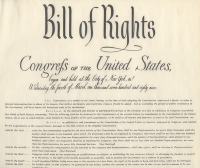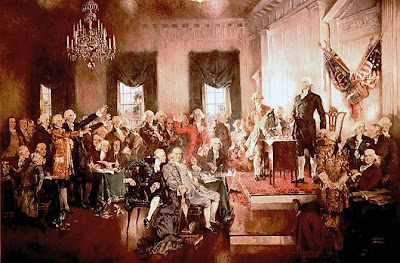
Custom Search
We the people...and other contradictions
Histryonics
Oct. 26, 2012
.jpg)
 I am willing to concede that the founding fathers were probably brighter than the average schmuck, but they were also well aware that forming a nation out of a bunch of outliers and rebellious types was a giant pain in the ass. And so the results of that difficult, almost impossible task is seen throughout our American Constitution. The appeasement of special interests, particularly, the individual states became so problematic that we fought a costly and protracted Civil War over it. And worse, failed to resolve the fundamental source of the conflict. No, not slavery; states' rights. But even so, what the founders didn't see, or anticipate 300- years ago included electricity, airplanes, moon walking, nuclear weapons, hippies, NASCAR, global economics and....the social media. Maybe Benjamin Franklin might have mused on a few of those ideas, but the rest? Doubtful. Which is why I fail to support the constitutionalists who want to retro-actively wander down memory lane and restore the nation to a marginal sort of sanity based on the nostalgia found in their enthusiastic support of dishonest history. Well, it ain't gonna happen that way friends. You cannot find solutions to complex, modern problems by simply reverting to what we might consider a 'kinder and simpler era.' I'm afraid that the Garden of Eden's got more snakes right now than apples, and waiting for Congress to come to its collective senses is delusional at best. And
I am willing to concede that the founding fathers were probably brighter than the average schmuck, but they were also well aware that forming a nation out of a bunch of outliers and rebellious types was a giant pain in the ass. And so the results of that difficult, almost impossible task is seen throughout our American Constitution. The appeasement of special interests, particularly, the individual states became so problematic that we fought a costly and protracted Civil War over it. And worse, failed to resolve the fundamental source of the conflict. No, not slavery; states' rights. But even so, what the founders didn't see, or anticipate 300- years ago included electricity, airplanes, moon walking, nuclear weapons, hippies, NASCAR, global economics and....the social media. Maybe Benjamin Franklin might have mused on a few of those ideas, but the rest? Doubtful. Which is why I fail to support the constitutionalists who want to retro-actively wander down memory lane and restore the nation to a marginal sort of sanity based on the nostalgia found in their enthusiastic support of dishonest history. Well, it ain't gonna happen that way friends. You cannot find solutions to complex, modern problems by simply reverting to what we might consider a 'kinder and simpler era.' I'm afraid that the Garden of Eden's got more snakes right now than apples, and waiting for Congress to come to its collective senses is delusional at best. And
Changing 'Fundamental Law' in America:
.jpg)
First lesson: The preamble (shown left), was an American invention. No, not us interlopers from Europe. It is an Iroquois quote from The Great Law of Peace, the six-nation confederacy of the Iroquois nations. And in case you are wondering, it didn't work out any better for them than it did for our founders. After ten years of wrangling under our own Articles of Confederacy, by 1787 it was pretty obvious that if an acceptable constitution was not forthcoming in the immediate future, the federal structure would simply collapse in disarray. The Confederacy was not "workable." Serious problems had already arisen from individual states making separate agreements (treaties), with European powers and Amerindian nations, without the consent or approval from the Continental Congress. Without the Convention's proposed central government, the framers feared the new nation could fall into the same trap as the Iroquois Confederacy. As the Iroquois themselves discovered, the Confederacy offered far "too much democracy," as well as being plagued by the "internal intrigues" that made cohesive governance of the separate nations virtually impossible to administer or enforce. Gee, sound a little familiar?
 |
| Not the Happy Campers One Might Assume! |
Fast forward to 2012 and all the compromises, back-door deals and legal patronization has finally caught up to us. Yes, too much democracy, too much value on personal liberty and way too much free speech. Oh, you say? Well, try to run a business like this country runs its affairs. Like shoeing a horse by committee. The son of a bitch will die of old age before the forge even gets lit. Yes, too much democracy is as paralyzing as too little. And 'your personal liberty is stepping all over mine!' Oh, and while we are discussing constitutional plagiarism, our cherished Bill of Rights? Yeah, swiped from the English Bill of Rights, though the English didn't always practice many of the provisions they espoused within the confines of their many colonial holdings. Course, neither did we.
 I am willing to concede that the founding fathers were probably brighter than the average schmuck, but they were also well aware that forming a nation out of a bunch of outliers and rebellious types was a giant pain in the ass. And so the results of that difficult, almost impossible task is seen throughout our American Constitution. The appeasement of special interests, particularly, the individual states became so problematic that we fought a costly and protracted Civil War over it. And worse, failed to resolve the fundamental source of the conflict. No, not slavery; states' rights. But even so, what the founders didn't see, or anticipate 300- years ago included electricity, airplanes, moon walking, nuclear weapons, hippies, NASCAR, global economics and....the social media. Maybe Benjamin Franklin might have mused on a few of those ideas, but the rest? Doubtful. Which is why I fail to support the constitutionalists who want to retro-actively wander down memory lane and restore the nation to a marginal sort of sanity based on the nostalgia found in their enthusiastic support of dishonest history. Well, it ain't gonna happen that way friends. You cannot find solutions to complex, modern problems by simply reverting to what we might consider a 'kinder and simpler era.' I'm afraid that the Garden of Eden's got more snakes right now than apples, and waiting for Congress to come to its collective senses is delusional at best. And
I am willing to concede that the founding fathers were probably brighter than the average schmuck, but they were also well aware that forming a nation out of a bunch of outliers and rebellious types was a giant pain in the ass. And so the results of that difficult, almost impossible task is seen throughout our American Constitution. The appeasement of special interests, particularly, the individual states became so problematic that we fought a costly and protracted Civil War over it. And worse, failed to resolve the fundamental source of the conflict. No, not slavery; states' rights. But even so, what the founders didn't see, or anticipate 300- years ago included electricity, airplanes, moon walking, nuclear weapons, hippies, NASCAR, global economics and....the social media. Maybe Benjamin Franklin might have mused on a few of those ideas, but the rest? Doubtful. Which is why I fail to support the constitutionalists who want to retro-actively wander down memory lane and restore the nation to a marginal sort of sanity based on the nostalgia found in their enthusiastic support of dishonest history. Well, it ain't gonna happen that way friends. You cannot find solutions to complex, modern problems by simply reverting to what we might consider a 'kinder and simpler era.' I'm afraid that the Garden of Eden's got more snakes right now than apples, and waiting for Congress to come to its collective senses is delusional at best. And
forget the blame game, the do-or-die ideologies, the my-way-or-the-highway thinking. It is a systemic dysfunction of our own creation. We let the thieves make the rules for the raiders and pillagers and there is only one treatment for that kind of behavior: take away their toys. Make 'fundamental' changes to the United States Constitution.
Article V
Ah! Okay, you say. But how? Well, I'm afraid that Congress is currently ahead of the curve on this one. Normally, there are two ways: the first is a proposal by Congress itself. This would require a 2/3 vote by both Houses of Congress. Now remember, this must represent a national super-majority of 67% in Congress (The House represents the people, the Senate represents the States.) The second step requires a super-super majority (75%), of the States ratifying, representing a majority of 'people' in the ratifying states. Congress itself determines the process: either by 'special state convention' or by individual state legislatures. Constitutional ratification is then approved by 3/4 of the states agreeing to the amendment by either of the aforementioned processes. The moment that 3/4th vote is hit, the amendment becomes the 'Supreme Law of the Land.' End of debate, but not necessarily the grumbling.
Now, it is important to consider that over 10,000 amendments have been introduced since 1789, normally, at least of late, about 100-200 a year. Since the Constitution's ratification, only 27 have been made into law.
 |
| We are in distress it would seem... |
There is another way, though Congress might have anticipated such an action. It is basically coming through the backdoor by a National Referendum or plebiscite. This is a direct vote by the electorate to 'accept or reject' a particular proposal. This is of course, an incidence of 'direct democracy.' However, no provision in US law, constitutional or otherwise, includes a provision for this type of action at the federal level. The people would first have to convince Congress to amend the Constitution to allow plebiscite action by the people to overrule the Congress and act by direct democracy in forcing constitutional reform at the federal level. Catch-22. Congress is highly unlikely to grant the people the direct power to destroy their power base. So then what?
One more option exists, though it has never been taken in the history of the country. It is a Constitutional Convention called by 2/3 of the legislatures of the States. That Convention can propose one or more amendments to the US Constitution. These amendments are then sent back to the states to be approved by 3/4 of the legislatures or state convention delegates. This route has often been discussed theoretically in political science circles, but both the logistics and legal questions have never been fully explored. However, the option does exist, hypothetically at least.
So what, you say? Well, all you tea-baggers, constitutional flag wrappers, occupiers, whiners and gripers, lefties, righties or indifferentials, libertarians, closet socialists, survivalists and gum chewers would all have to get on the same page and convince Congress to amend the Constitution so that us plebs can then directly take away their toys, medical benefits, perks, corporate drinking buddies, car allowances, junkets, free meals, hookers, tax deductions.....or, simply overthrow the existing government by force. My opinion: overthrowing the government is a hell of a lot of work. You've all seen Egypt, Libya, Iraq...geez. What a mess. But just maybe we could all get on the same page just long enough to sweep all the loose money out of the Capitol Building. Might just be amazed at the results.
Happy Birthday America and best of luck.......
